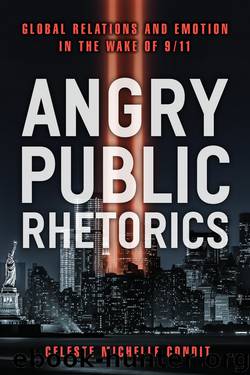Angry Public Rhetorics: Global Relations and Emotion in the Wake of 911 by Celeste Condit

Author:Celeste Condit
Language: eng
Format: epub
Publisher: University of Michigan Press
Chapter 6
Susan Sontag’s Angry “Howl”
In the first few weeks after 9/11, American elected officials of both major political parties stood beside President Bush and supported his policy agenda with almost no dissent.1 The skill of the president’s rhetorical team in crafting a compelling version of the anger script surely accounts in substantial part for this near-unanimity. But if the power of language for humanity lies largely in discourse’s capacity to construct novel options, then accounting for the success of any particular script also requires comparing it to the other available options. The primary alternative rhetoric calling for Americans to rally on normative grounds in response to the events of 9/11 came from public intellectuals on the nation’s radical political left, most notably Noam Chomsky and Susan Sontag.2 Left-leaning individuals including Robert Jensen and Ward Churchill, who had less public recognition at the time, were able to offer similar versions of this alternative rhetoric in letters published in newspapers or on less prominent websites.3
The claim that these statements cohere as a set rests on a different basis from the cases of bin Laden and Bush. Their status as leaders of evidently pivotal organizations made it relatively straightforward to isolate a particular corpus of rhetoric that circulated as a set because it circulated in their name (whatever the complexities of staff writers and translations). In the present chapter, the analysis grew from the identification of a set of highly similar rhetorics toward the discovery of an identity that might be said to link the authors of the statements.
It initially seemed that the group might share a social history (i.e., the “postbeat” generation, a set of cosmopolitan “thinkers and artists who commingle but are alone together”).4 Upon investigation there turned out to be too much diversity among the ages and experiences of the authors to warrant such a grounding. Sontag and Chomsky were born within seven years of each other, but Jensen and Churchill were not. Sontag and Chomsky were politically radicalized by the Vietnam War, but the younger advocates seem to have been more motivated by issues of gender or race. Chomsky, Jensen, and Churchill were university professors, but Sontag usually operated as an independent writer and director. The advocates tended to hail from areas of specialization that were closely related to communication, but linguistics, journalism, ethnic studies, and popular culture hardly form a monolith. Jensen claims to be a radical Christian, Sontag has set aside a Jewish heritage, and Chomsky is a deliberately tolerant agnostic or atheist. Sontag and Chomsky were well traveled, and in Sontag’s case her adoption of Paris as a home of the heart seems clearly to have been central to the sense of herself as a “foreigner.”5 But, again, Jensen’s rhetoric—though it shares a critique of America—does not seem to have grown from extensive experience as an expatriate.
The only identifiable substantive factor that these advocates seem to have shared was a well-elaborated set of beliefs: that the United States, typically seen as the current leader of an
Download
This site does not store any files on its server. We only index and link to content provided by other sites. Please contact the content providers to delete copyright contents if any and email us, we'll remove relevant links or contents immediately.
| Elections & Political Process | Ideologies & Doctrines |
| International & World Politics | Political Science |
| Public Affairs & Policy | Specific Topics |
| United States |
The Secret History by Donna Tartt(19052)
The Social Justice Warrior Handbook by Lisa De Pasquale(12187)
Thirteen Reasons Why by Jay Asher(8893)
This Is How You Lose Her by Junot Diaz(6877)
Weapons of Math Destruction by Cathy O'Neil(6264)
Zero to One by Peter Thiel(5786)
Beartown by Fredrik Backman(5737)
The Myth of the Strong Leader by Archie Brown(5499)
The Fire Next Time by James Baldwin(5431)
How Democracies Die by Steven Levitsky & Daniel Ziblatt(5215)
Promise Me, Dad by Joe Biden(5141)
Stone's Rules by Roger Stone(5081)
A Higher Loyalty: Truth, Lies, and Leadership by James Comey(4954)
100 Deadly Skills by Clint Emerson(4921)
Rise and Kill First by Ronen Bergman(4779)
Secrecy World by Jake Bernstein(4741)
The David Icke Guide to the Global Conspiracy (and how to end it) by David Icke(4707)
The Farm by Tom Rob Smith(4502)
The Doomsday Machine by Daniel Ellsberg(4484)
